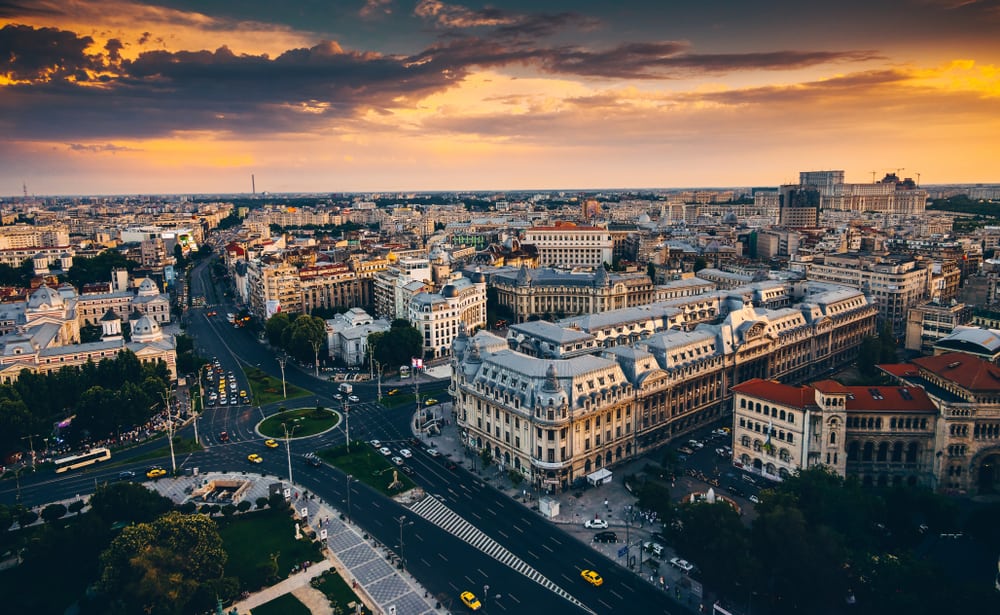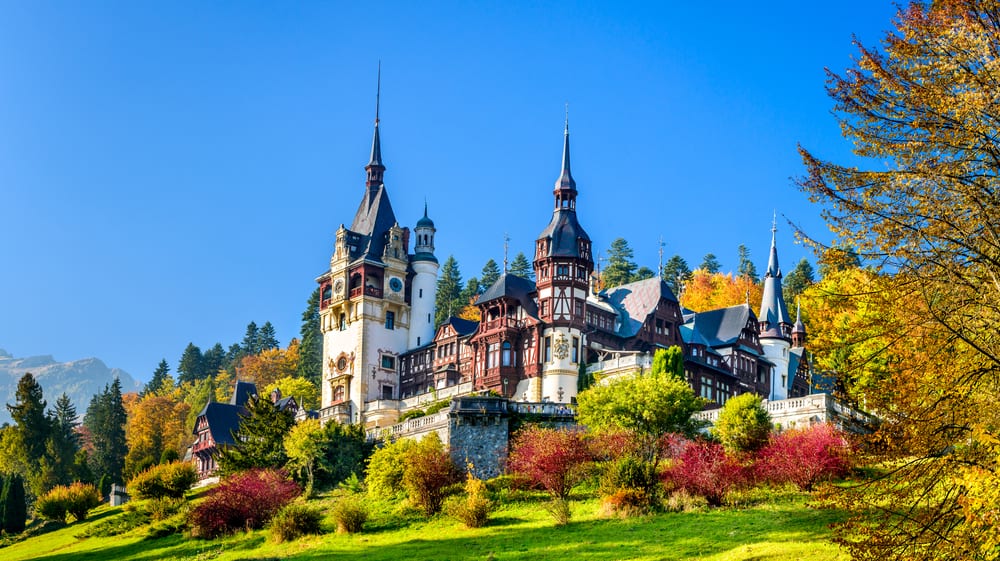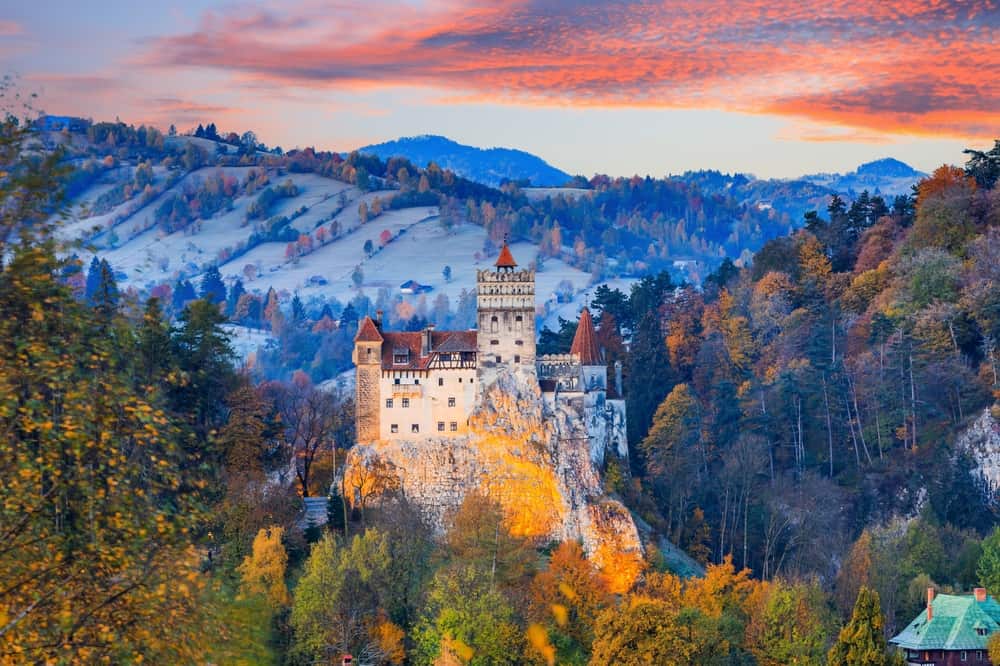 With dramatic scenery and landscapes which are thought to have inspired Bram Stoker’s Dracula, Romania is a country full of culture and intrigue – but do you know what you need in order to up sticks from the United Kingdom and successfully move to Romania?
With dramatic scenery and landscapes which are thought to have inspired Bram Stoker’s Dracula, Romania is a country full of culture and intrigue – but do you know what you need in order to up sticks from the United Kingdom and successfully move to Romania?
If you are considering making the move from the United Kingdom to Romania, this guide will tell you everything you need to know – from visa requirements to cost of living differences; healthcare top tips to rules about moving country with your pets – helping you to feel empowered when the time comes to make the big move.
Quick Romania Facts:
- Population: 19.12 million (2021 estimate)
- Official Language: Romanian (de facto) spoken by 91% of the population
- GDP Per Capita: $14,850 USD (2021 estimate)
- Random Fact: Romania is home to one of the world’s heaviest buildings – the Palace of Parliament in Bucharest which totals more than four million tonnes!
- Currency: Romanian Leu (RON). As of late 2023, £1 = 5.73 RON, €1 = 4.97 RON, $1 CAD = 3.34 RON, $1 AUD = 2.99 RON
1. How Long Does It Take To Move to Romania from the United Kingdom?
Let’s take a closer look at some common flight paths and their associated flight times to get you from the UK to Romania:
- London Heathrow to Bucharest – 3 hours, 15 minutes – £100
- London Gatwick to Bucharest – 3 hours, 10 minutes – £40
- Edinburgh to Bucharest – 3 hours, 35 minutes – £65
This duration covers the flight time only, so additional time will need to be added to get you from the terminal to your final location.
2. Moving Restrictions to Romania from the UK
Moving from one country to take up residency in another will incur various restrictions – most notably, this comes in the form of visa requirements, which we will cover in the next section.
Gov.uk advises that your passport must be valid at the time of travel, and be issued less than 10 years before your date of entry to Romania. It must have at least 3 months left on the expiry date.
It’s important to note that your passport will be stamped upon entry and exit to check that you have not overstayed your 90-day visa-free limit for short stays in Romania. It may also be necessary for you to show proof of onward travel or of funds to sustain you during the trip.
There are strict customs rules in place for travel to and from Romania, information on which can be found in the customs.ro website.
There are currently no COVID-19 travel restrictions, but it’s advised that you keep up-to-date on any developments to ensure you are abiding by the most recent information at the time of travel.
3. Visa Requirements to Romania from the UK
Gov.uk says that you are permitted to enter Romania and stay for up to 90 days in any 180-day period without a visa. This is applicable for those:
- Travelling as a tourist
- Visiting family or friends
- Attending business meetings or events
- Attending short-term studies or training
If you wish to stay for a longer period of time or to work, you will need a visa and work permit to be able to do so legally, which we will cover in later sections.
In all cases, you need to speak to a visa specialist to advise you on your individual circumstances and always keep up to date with the latest changes in the rules.
4. Cost of Living Differences in Romania
 While this article is covering Romania as a whole, house prices will obviously vary from area to area but the figures below will give you an indication of what’s available at what price.
While this article is covering Romania as a whole, house prices will obviously vary from area to area but the figures below will give you an indication of what’s available at what price.
As a general note, it is estimated that the cost of living in Romania is 48.4% lower than that of the United Kingdom, with rent being around 81.1% lower.
Monthly Rental Prices in Romania:
- 1 bedroom flat (apartment) in City Centre: 2,500+ RON
- 1 bedroom flat outside the City Centre: 1,700+ RON
- 3 bedroomed flat in City Centre: 4,300+ RON
- 3 bedroomed flat outside the City Centre: 2,900+ RON
Romania Home Purchase Prices:
- Price per square metre (10.7 square feet) to buy in City Centre: 11,800+ RON
- Price per square metre (10.7 square feet) to buy outside the City: 7,000+ RON
Source: Numbeo
5. Tax Treaties in Romania
The rate of personal income tax in Romania is between 10% and 45%, with the exact fee being dependant on the individual’s gross income, and whether or not it reaches certain thresholds.
Corporate income tax is set at 16%, while some reduced rates may apply to certain companies that meet eligibility criteria. The VAT rate stands at 19% generally, while reduced rates of 5% and 9% may apply to select goods and services.
If you are working and employed by a Romanian company, you will pay and contribute towards social security. This will help to fund benefits such as state healthcare, pension funds and unemployment benefits.
As with any figure, these can change over time, so it’s important to get the most updated information that’s relevant to you when the time comes for your move.
6. Working Rules in Romania
If you wish to work and stay in Romania, you will need a work permit and visa to do so legally. These are compulsory for non-EU/EEA/Swiss foreign individuals.
The work permit will be needed to grant the individual a long-stay visa or a residence permit. It is illegal to work in Romania as a foreigner without a work permit.
It’s important to note that the work permit doesn’t cover the individual for a range of professions or jobs – it will be specific to a singular position or job offer and will need to be re-applied for if your position or company changes – even if there is time validity on the existing permit.
The types of work permits can range from:
- Local hire work permit
- Highly-skilled employee work permit
- Assignee work permit
- ICT worker work permit
For full information on work permits and their associated criteria, take a look at this page from the KPMG.
Whatever your employment circumstances, it’s important to have your visa ironed out before entering the country to ensure a smooth transition. It’s also important to get up to speed with taxes and any beneficial programs, such as healthcare schemes so that you are completely clued up on your rights.
7. Healthcare in Romania
While the UK benefits from the NHS, offering free healthcare to those who need it, as well as elective private healthcare for a fee, in Romania, parts of their state healthcare is free, while you will need to pay to access other parts of it.
Gov.uk advises that you will need to register with your local Health Insurance House, known as CAS in Romanian, to access state healthcare. UK nationals can access the healthcare system by:
- Paying Social Security contributions
- Using their European Health Insurance Card (EHIC) or Global variant (GHIC)
- Registering a UK-issued S1 form with CAS
- Paying for private healthcare
It’s important to note that having private healthcare should not act as your alternative to accessing state healthcare if you live and work in Romania. Proof of medical insurance will be needed to register as a resident of Romania, and will also be needed when you apply for a visa.
8. Rules Around Moving With Pets in Romania
Moving house includes lots of boxes of belongings – but it can also include some particularly important furry friends, too! If you need to move to Romania with a pet in tow, here’s what you need to know.
Gov.uk says that you must ensure that your pet – including cat, dog and ferret – has:
- A microchip
- Valid rabies vaccination
- Animal health certificate or pet passport
Your pet must be deemed fit and healthy to travel at least 10 days before your trip to ensure the safety of them during the journey.
9. Similar Cities
 According to the Country Similarity Index, Moldova ranks highest as the country most akin to Romania. During World War II, the countries split apart to become their own entities, giving both locations a shared historical background.
According to the Country Similarity Index, Moldova ranks highest as the country most akin to Romania. During World War II, the countries split apart to become their own entities, giving both locations a shared historical background.
The countries have obvious geographical similarities as they are neighbouring countries in Eastern Europe, but Romania is far larger with a more diverse geography. Moldova is smaller by comparison and is landlocked.
Although Romania has a larger population, Moldova is thought to be more densely populated owing to the country’s size. Moldova shares some cultural ties with Romania, but has Russian and Soviet influences as well, whereas Romania has Latin, Ottoman and Eastern European influences.
10. Pros and Cons of Moving to Romania from the UK
Perhaps you’re moving for a new job opportunity, or just want to try out a completely different country and climate – whatever your reason for wanting to move from the UK to Romania, let’s take a look at some of the main pros and cons associated with moving.
| Advantages of Moving from the UK to Romania | Disadvantages of Moving from the UK to Romania |
|---|---|
| Scenic Diversity: Romania offers diverse landscapes, from the Carpathian Mountains to the Black Sea coast, providing opportunities for outdoor activities | Economic Challenges: Romania faces economic challenges, and the average income may be lower compared to some Western European countries |
| Cultural Richness: Romania has a rich cultural heritage with medieval castles, vibrant traditions and a mix of influences from various civilisations | Language Barrier: While English is increasingly spoken, particularly in urban areas, language differences may pose challenges in some regions |
| Cost of Living: The cost of living in Romania is generally lower than in the UK, making it an attractive option for those seeking affordable living expenses | Bureaucratic Processes: Some expatriates may find certain bureaucratic processes and administrative procedures more complex than in their home country |
| Historical Heritage: Romania has a rich history, including ancient fortresses, monasteries and cities that provide a unique historical experience | Infrastructure Development: While improving, infrastructure development in some areas may not be as advanced as in more economically developed countries |
Whatever you decide, you must understand the legal factors affecting your move – be sure to check Gov.uk for all the information you need.